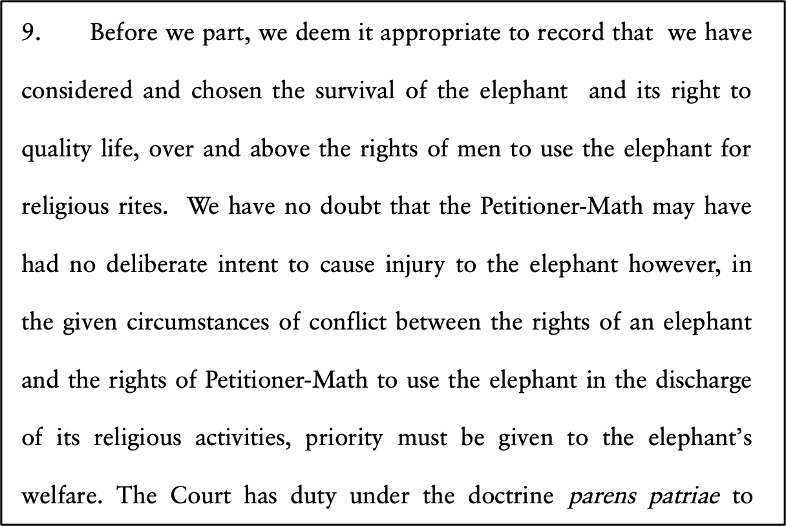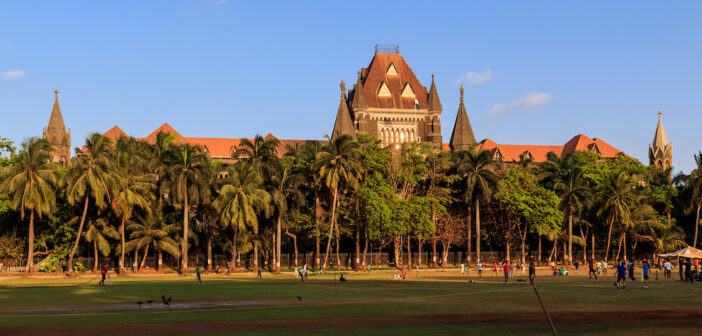In this edition of Court judgements review, we look at SC’s order where it held that a tribal woman is entitled to equal share in ancestral property, Bombay HC’s order mother is child’s natural guardian after father’s death, Madras HC’s ruling that temple worship cannot be restricted by caste, among others.
SC: Tribal woman is entitled to equal share in ancestral property
The case, Ram Charan & Others vs. Sukhram and Others, concerned a civil suit filed by the legal heirs of Dhaiya, a Scheduled Tribe woman, seeking partition of ancestral property owned by her father, Bhajju Gond. The plaintiffs claimed Dhaiya was one of six children (five sons and one daughter) and thus entitled to an equal share. After other heirs refused partition in 1992, they approached the Trial Court, which dismissed the suit. The First Appellate Court and the Chhattisgarh High Court upheld the decision, ruling that female tribal heirs had no right in ancestral property due to the absence of proven custom or applicable statutory law.
The appellants argued that in the absence of a specific tribal custom, principles of justice, equity, and good conscience should apply, ensuring equality. They also contended that denying women inheritance rights violated constitutional guarantees under Articles 14 and 15. The respondents relied on the inapplicability of the Hindu Succession Act to Scheduled Tribes under Section 2(2), and the absence of customary law allowing female inheritance.
The Supreme Court bench of Justices Sanjay Karol and Joymalya Bagchi set aside the lower courts’ rulings. It held that in the absence of specific tribal law or proven custom either allowing or denying inheritance to women, the principle of justice, equity, and good conscience must prevail. It further stated that denying a tribal woman inheritance rights without legal basis violates Article 14 of the Constitution. The Court emphasised that customs must evolve with constitutional values and cannot be used to justify gender discrimination. Thus, it ruled that Dhaiya’s heirs were entitled to an equal share, allowing the civil appeal.
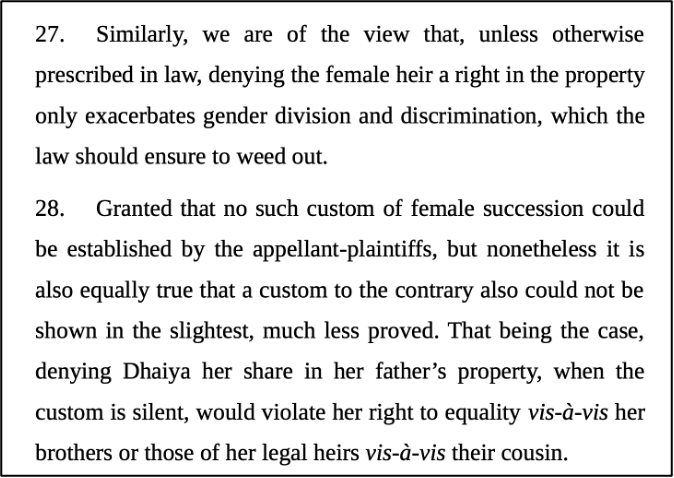
Bombay HC: Mother is child’s natural guardian after father’s death
Following the death of her ex-husband in January 2025, a woman approached the Bombay High Court seeking interim custody of her 5 and half-year-old daughter in Parvati vs. Vyankat & Another. The child had been living with her paternal grandparents ever since the parents’ mutual divorce in 2018, during which custody was granted to the father. After his passing, the grandparents filed for guardianship, and the mother, claiming improved personal and financial circumstances, moved to regain custody. However, the District Judge, Mukhed, rejected her application, prompting her to challenge the decision.
The petitioner argued that as the child’s natural guardian under Section 6 of the Hindu Minority and Guardianship Act, 1956, she had a stronger legal right to custody, especially since she was now better placed to ensure the child’s welfare. She cited her ability to provide good education and a stable home. The grandparents contended that the child had lived with them since birth, was emotionally attached, and that the mother had been largely absent. They claimed her earlier willingness to relinquish custody should be held against her.
Justice S.G. Chapalgaonkar of the High Court ruled in favour of the mother, stressing that the welfare of the child is the primary concern. It found no evidence of incapacity or neglect on the mother’s part and emphasised that her earlier absence did not amount to abandonment. Noting the importance of maternal care, especially for a young girl, the Court granted interim custody to the mother. However, to preserve the child’s bond with her grandparents, it also allowed them weekend visitation and custody during festivals and vacations.
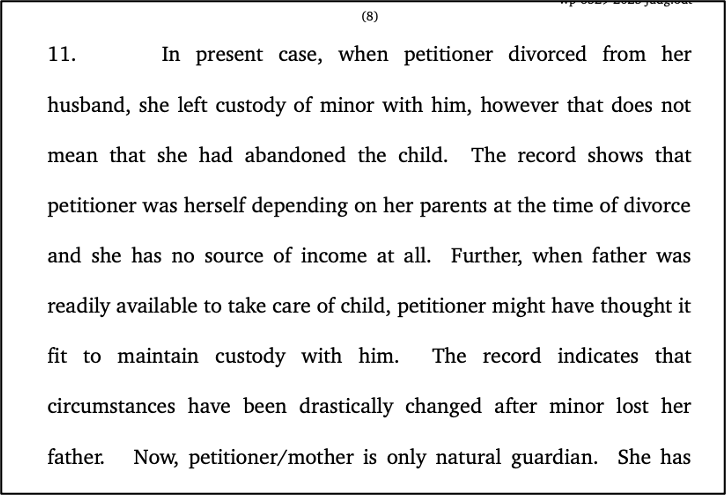
Madras HC: Temple worship cannot be restricted by caste
The Madras High Court has directed local authorities to ensure that members of the Scheduled Caste community are allowed to enter the Arulmigu Puthukudi Ayyanar Temple and participate in its car festival scheduled from 16 July to 31 July 2025. The petitioner in Venkatesan vs. District Collector and others sought a writ of mandamus to prevent caste-based discrimination in temple access and participation in rituals.
The State submitted that the temple was not under the control of the HR&CE Department. However, the Court observed that if a temple is open to the public, it becomes a public temple regardless of who manages it. As such, entry cannot be restricted based on caste or community. The judge stated that caste is a man-made division and has no place in matters of faith or worship.
Referring to Section 3 of the Tamil Nadu Temple Entry Authorisation Act, 1947, the Court held that every Hindu, regardless of caste or sect, has a legal right to enter any temple and offer prayers. Denying access based on caste amounts to an actionable wrong and is punishable under law.
The Court directed the concerned authorities to permit all classes of Hindus to enter the temple and participate in the festival. It also instructed that action be taken against anyone attempting to prevent such participation and that law and order be maintained. The writ petition was disposed of with these directions.
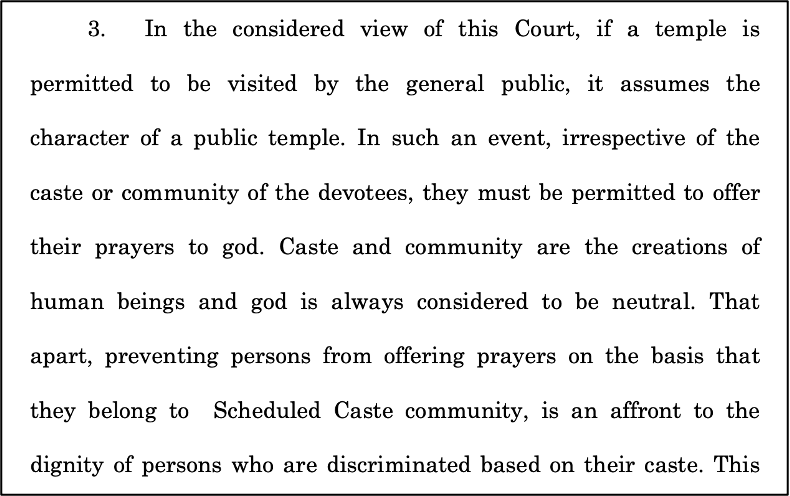
Himachal Pradesh HC: Voluntary retirement becomes valid if government doesn’t respond within notice period
In the case, Dr Seema Sharma vs. The Secretary (Health) to the Government of Himachal Pradesh & Others, the petitioner, a medical professional working under the Himachal Pradesh government, approached the High Court after her request for premature retirement was rejected without citing reasons for the same. She had applied for voluntary retirement under Rule 4(2) of the H.P. Civil Services (Premature Retirement) Rules, 2022, citing family reasons.
As required by the rules, she gave a three-month notice through proper official channels. However, during this notice period, the government did not respond. Assuming her retirement had taken effect, Dr Sharma stepped down from her post on 08 January 2025, and requested the release of her pension and other retirement benefits. Surprisingly, more than two months later, the State rejected her request, saying she did not meet the eligibility conditions, but did not explain how.
Justice Sandeep Sharma of the Himachal Pradesh High Court held that under Rule 4(2), if the government does not clearly reject the retirement request within the notice period, then the retirement is automatically accepted. The Court said the State’s late rejection had no legal value. It also noted that giving no reason for rejection was unfair and violated Article 14 of the Constitution, which guarantees equality before the law. Referring to a Supreme Court ruling, the Court stressed that once the deadline passes without refusal, retirement takes effect. It directed the government to process her retirement and release all dues within two months.
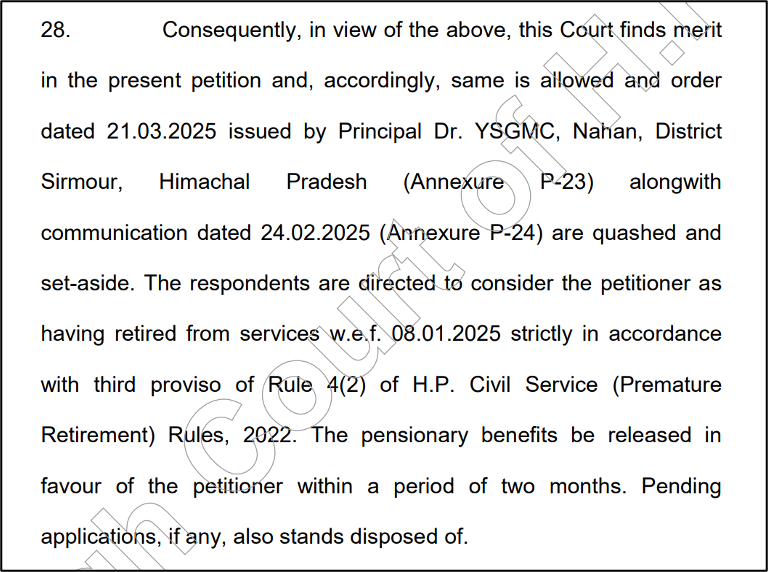
Bombay HC: Elephant welfare prevails over religious sentiment
The case Swasthishri Jinsen Bhattarak vs. Union of India & Others involved an elephant named Mahadevi, owned by a Jain Math (religious institution) in Kolhapur. A complaint filed by PETA India to the Animal Welfare Board of India (AWBI) alleged that Mahadevi was being kept in poor conditions. A High-Power Committee (HPC), constituted by the court, inspected the elephant and found signs of foot rot, solitary confinement, and lack of veterinary care. Based on this, the HPC recommended her relocation to the Radhe Krishna Temple Elephant Welfare Trust (RKTEWT), a recognised care facility in Gujarat. The Math opposed the move, citing religious customs and ownership rights.
The petitioner (the Math’s head) argued that Mahadevi was a sacred part of religious practice and was being properly looked after. They contended that her removal would violate their right to religious freedom under Article 25 of the Constitution. They also questioned the motives of PETA and claimed the elephant’s health had improved. Conversely, the respondents argued that the Math failed to meet basic welfare standards and that animal well-being must take precedence.
The Bombay High Court’s division bench of Justices Revati Mohite-Dere and Dr Neela Gokhale upheld the HPC’s findings and emphasised that religious tradition cannot override an animal’s right to proper care. It ruled that Mahadevi must be shifted to RKTEWT within two weeks. The Court stated that constitutional values and the welfare of sentient beings must prevail, even over religious sentiments.
